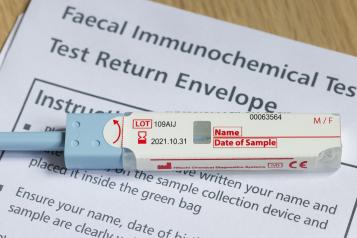Your questions about cervical screening answered
Take our 2 minute survey
Uptake of screening services in Islington is low. We're collecting your feedback on breast, cervical, and bowel screening so we can help service leaders understand what makes it easier for people to attend these appointments.
Cervical screening (a smear test) checks the health of your cervix. The cervix is the opening to your womb from your vagina. It's not a test for cancer, it's a test to help prevent cancer.
The test checks for the presence of high-risk Human Papillomavirus (HPV). This is the virus that causes nearly all cervical cancers.
- If these types of HPV are not found, nothing else needs to happen.
- If these types of HPV are found, the sample is then checked for any changes in the cells of your cervix. These can then be treated before they get a chance to turn into cervical cancer.
Dr Rea gave a cervical screening presentation giving lots more useful information and then answered questions from residents.
Questions
Can someone be HPV positive at one smear and then be HPV negative the next time they’re tested?
Yes. Many people’s immune systems will clear an HPV infection and test negative in the future. The time frame varies for this from person to person.
Find out more about the link between cancer and HPV on the Cancer Research UK website
How effective is the HPV vaccine at preventing cervical cancer?
We still need more, long-term research to fully understand the impact of the HPV vaccine on cervical cancer. However, a study in England has looked at the first HPV vaccine called Cervarix, which was used between 2008 and 2012. It protects against 2 types of HPV that, together, are thought to cause around 7 in 10 (70%) cervical cancers.
The study found that women who were vaccinated in their teens have had about 450 fewer diagnoses of cervical cancer. This means the incidence of cervical cancer has decreased by 87% in women in their 20s.
Find out more about the HPV Vaccine
Does the Smear Test detect all HPV strains?
No. A smear test looks for types of HPV that are at higher risk of leading to cervical cancer only.
Are there any reasons (apart from having Covid symptoms) that prevent people from having a smear done at the time of their appointment?
It’s better to avoid attending during your period as it can affect the success of the test. It’s ideal to come in the middle of your cycle.
If you are asked to come for a routine smear test while you are pregnant you should put it off until after your baby is born. Let your GP know and they will be able to delay your invitation and invite you again 3 months after you give birth.
If someone has found a cervical smear painful, is there any way to make it more comfortable next time?
Some of the discomfort can be around positioning. You could always lie on your side rather than your back. If you are lying on your back, you could tilt the pelvis by putting your hands underneath your bottom.
The type and size of speculum can also have an impact. If you’ve had a good experience, ask what the speculum size is so you can ask for it next time. You can always ask them to start with a smaller speculum and move up sizes if they need to.
If you’ve previously had a negative experience, tell the clinician so they are aware and know they might need to proceed more slowly.
Try relaxation exercises and know that you can always ask the clinician to stop at any time if you are in discomfort.
How would you support someone with a Learning Disability who is nervous of having a smear test?
Your GP team should know already but best to flag that you have a learning disability when booking your smear test appointment. It might be beneficial to have a longer appointment. You don’t have to have the procedure during that appointment, but could talk through the procedure with the clinician if this makes you more comfortable. You can also request to have a clinician you know and trust and/or ask to bring along your own chaperone if this would help you feel more comfortable.
Where can we find out more resources about Cervical Cancer Screenings?
Jo’s Trust is a great resource around smear tests and cervical cancer in general.
What information is given to children when they are given the HPV vaccine? Are they encouraged to ask questions? Is the information repeated at later time intervals? What is Islington doing to overcome cultural barriers?
A lot of this is centred around schools. They send out information ahead of giving the vaccines. You can also catch up by booking in at your GP surgery.


